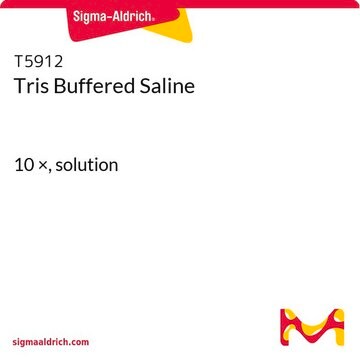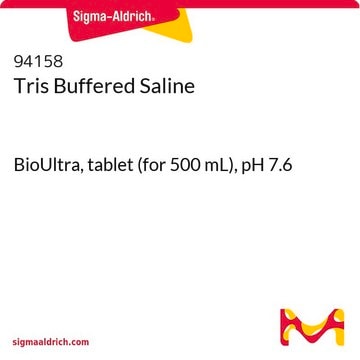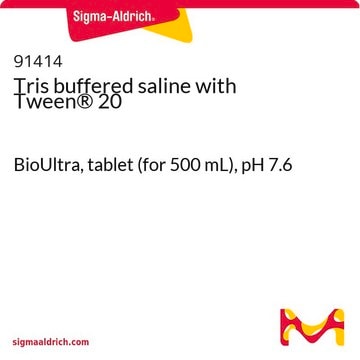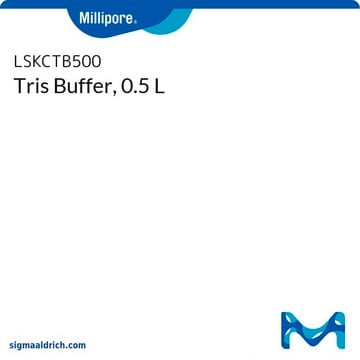T6664
Tris Buffered Saline
powder, pH 8.0
Synonym(s):
TBS
Sign Into View Organizational & Contract Pricing
All Photos(1)
About This Item
Recommended Products
product name
Tris Buffered Saline, pH 8.0, powder
form
powder
pH
8.0
Looking for similar products? Visit Product Comparison Guide
Application
Tris Buffered Saline has been used:
- to block cells fixed in paraformaldehyde for immunofluorescence imaging
- as a component in cell lysis buffer for DNA extraction
- in goat serum and Triton-X 100 for blocking and permeabilizing cells for immunocytostaining respectively
Packaging
Foil pouches
Reconstitution
Contents of one pouch, when dissolved in one liter of distilled or deionized water, will yield 0.05 M Tris buffered saline (NaCl - 0.138 M; KCl - 0.0027 M); pH 8.0, at 25 °C.
Storage Class Code
11 - Combustible Solids
WGK
WGK 1
Flash Point(F)
Not applicable
Flash Point(C)
Not applicable
Certificates of Analysis (COA)
Search for Certificates of Analysis (COA) by entering the products Lot/Batch Number. Lot and Batch Numbers can be found on a product’s label following the words ‘Lot’ or ‘Batch’.
Already Own This Product?
Find documentation for the products that you have recently purchased in the Document Library.
Customers Also Viewed
Arun Prasad Rao et al.
Contemporary clinical dentistry, 5(3), 296-301 (2014-09-06)
The development of dental caries has been associated with the oral prevalence of Streptococcus mutans. Four serotypes of S. mutans have been reported, namely serotype c, e, f, and k that are classified based on the composition and linkages of
Kevin D Rynearson et al.
Bioorganic & medicinal chemistry, 28(22), 115734-115734 (2020-10-03)
The evolution of gamma-secretase modulators (GSMs) through the introduction of novel heterocycles with the goal of aligning activity for reducing the levels of Aβ42 and properties consistent with a drug-like molecule are described. The insertion of a methoxypyridine motif within
Susanna Trapp et al.
Journal of virology, 83(2), 884-895 (2008-11-14)
Human immunodeficiency virus (HIV) is taken up by and replicates in immature dendritic cells (imDCs), which can then transfer virus to T cells, amplifying the infection. Strategies known to boost DC function were tested for their ability to overcome this
Our team of scientists has experience in all areas of research including Life Science, Material Science, Chemical Synthesis, Chromatography, Analytical and many others.
Contact Technical Service









